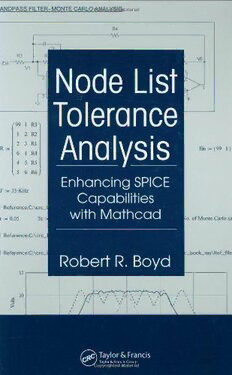
Most books are stored in the elastic cloud where traffic is expensive. For this reason, we have a limit on daily download.
Preview Node List Tolerance Analysis
Description:
Developed at UC Berkeley more than two decades ago, SPICE software is the tool of choice for performing nominal analysis for electronic circuits. However, attempts to use SPICE for worst-case analysis (WCA) reveal several shortcomings, including: a 400-sample limit for Monte Carlo Analysis (MCA); lack of Rot-Sum-Square (RSS) analysis, asymmetric component tolerances, Fast MCA, or AC sensitivity capability; no single-run method of tolerancing inputs; and no predefined beta (skewed) or bimodal (gapped) distributions for MCA. While several commercial versions of SPICE may have corrected some of these limitations, they still remain rather expensive.Based on extensive experience in WCA, Node List Tolerance Analysis: Enhancing SPICE Capabilities with Mathcad presents software methods that overcome the many limitations of SPICE WCA using less expensive tools. The author demonstrates correct and incorrect methods of extreme value analysis, demonstrates the necessity of tolerancing multiple inputs, and provides output histograms for unusual inputs. He also shows how to detect non-monotonic components, which cause severe errors in all WCA methods except MCA. The book also includes demonstrations of tolerance analysis of three-phase AC circuits.Node List Tolerance Analysis: Enhancing SPICE Capabilities with Mathcad requires no circuit analysis mathematics, supplying original methods of nominal circuit analysis using node lists. It is ideal for performing effective analyses while adhering to a budget.
See more
The list of books you might like
Most books are stored in the elastic cloud where traffic is expensive. For this reason, we have a limit on daily download.
